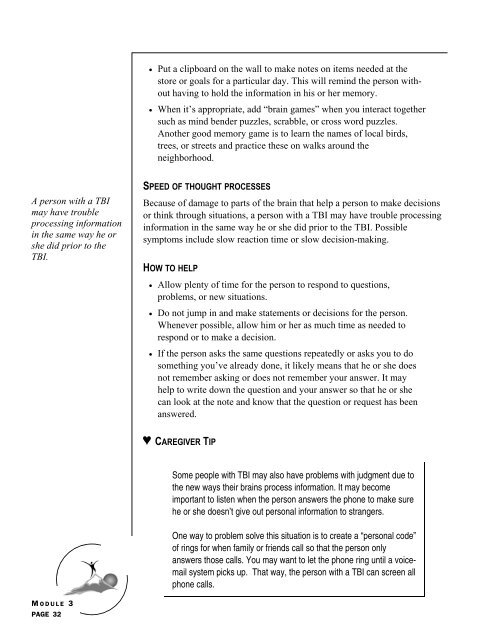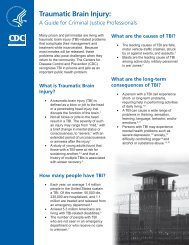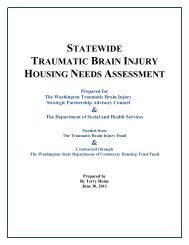caregiver tip - Traumatic Brain Injury Council
caregiver tip - Traumatic Brain Injury Council
caregiver tip - Traumatic Brain Injury Council
Create successful ePaper yourself
Turn your PDF publications into a flip-book with our unique Google optimized e-Paper software.
• Put a clipboard on the wall to make notes on items needed at the<br />
store or goals for a particular day. This will remind the person without<br />
having to hold the information in his or her memory.<br />
• When it’s appropriate, add “brain games” when you interact together<br />
such as mind bender puzzles, scrabble, or cross word puzzles.<br />
Another good memory game is to learn the names of local birds,<br />
trees, or streets and practice these on walks around the<br />
neighborhood.<br />
A person with a TBI<br />
may have trouble<br />
processing information<br />
in the same way he or<br />
she did prior to the<br />
TBI.<br />
SPEED OF THOUGHT PROCESSES<br />
Because of damage to parts of the brain that help a person to make decisions<br />
or think through situations, a person with a TBI may have trouble processing<br />
information in the same way he or she did prior to the TBI. Possible<br />
symptoms include slow reaction time or slow decision-making.<br />
HOW TO HELP<br />
• Allow plenty of time for the person to respond to questions,<br />
problems, or new situations.<br />
• Do not jump in and make statements or decisions for the person.<br />
Whenever possible, allow him or her as much time as needed to<br />
respond or to make a decision.<br />
• If the person asks the same questions repeatedly or asks you to do<br />
something you’ve already done, it likely means that he or she does<br />
not remember asking or does not remember your answer. It may<br />
help to write down the question and your answer so that he or she<br />
can look at the note and know that the question or request has been<br />
answered.<br />
♥ CAREGIVER TIP<br />
Some people with TBI may also have problems with judgment due to<br />
the new ways their brains process information. It may become<br />
important to listen when the person answers the phone to make sure<br />
he or she doesn’t give out personal information to strangers.<br />
One way to problem solve this situation is to create a “personal code”<br />
of rings for when family or friends call so that the person only<br />
answers those calls. You may want to let the phone ring until a voicemail<br />
system picks up. That way, the person with a TBI can screen all<br />
phone calls.<br />
M ODULE 3<br />
PAGE 32






